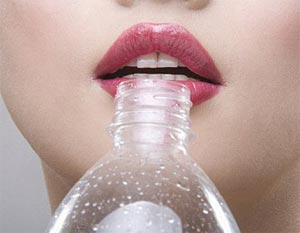플라스틱 병에 들어있는 물이나 음료를 일주일 동안만 마셔도(drinking water or beverage from plastic bottles)‘성 교란’ 화학물질의 체내 농도가 3분의 2 이상 늘어난다는(raise the body’s levels of a ‘gender-bending’ chemical by more than two thirds) 연구 결과가 나왔다.
미국 하버드대 공중보건대학원 연구진(researchers from Harvard School of Public Health)이 77명의 학생들을 대상으로 연구 조사한 결과에 따르면, 폴리탄산에스테르(합성수지의 일종) 병으로 일주일간 음료를 마신(drink for a week from polycarbonate bottles) 사람들은 여성 호르몬인 에스트로겐을 닮은(mimic the female sex hormone estrogen) 비스페놀 A(BPA)의 소변 내 함유량이 69% 증가한 것으로 나타났다(show a 69 per cent increase in their urine of BPA).
이와 관련, 전문가들은 BPA가 건강에 미칠 영향 가능성에 대해 우려하고(be concerned about the possible health effects of BPA) 있다. BPA는 아기들의 젖병 등 수 많은 음식·음료 플라스틱 용기를 만들 때 일상적으로 사용되는 화학물질(an everyday chemical used in many plastic food and drink containers including nursing bottles)이기 때문이다. 일부 국가들에선 BPA가 공식적인 독성물질로 분류돼(be officially classified as toxic in some countries) 있기도 하다.
연구진은 이번 연구 테스트에 앞서 대상자들에게 7일간의 ‘세척’ 단계를 거치도록(first undergo a seven-day ‘washout’ phase) 했다. 대상자들의 BPA 노출을 최소화하기 위해(in order to minimize BPA exposure) 스테인레스 병에 든 차가운 음료만 마시게(drink cold beverages from stainless steel bottles) 했다.
그리고 2병의 플라스틱 병이 주어졌고(be then given two plastic bottles), 다음 일주일 동안은 그 병들의 차가운 음료만 마시도록 했다(be asked to drink cold beverages from them during the next week).
이번 테스트에는 차가운 음료만 사용됐지만, 플라스틱 병의 음료를 데울 경우 문제는 더욱 심각할 것으로 보인다. 특히(in particular) 애기의 우유를 데우기 위해 병을 가열하는 것(heating the bottles to warm baby’s milk)은 안에 들어있는 우유에 위험한 분량의 화학물질이 새어 들게 하는 결과를 초래(cause the chemical to leak in dangerous quantities into the liquid contained within)할 수 있다.
이와 관련, 가장 최근의 이번 조사 선임 연구원(the senior researcher of the latest study)인 하버드공중보건대학원 조교수 캐린 미셸 박사는 “젖병 같은 것을 가열하면 BPA 농도가 현저히 높아질 것(expect the levels to be considerably higher)”이라면서 “유아들은 특히 BPA의 호르몬 분비장애 잠재력에 취약할 수 있기 때문에(since infants may be particularly susceptible to BPA’s hormone gland-disrupting potential) 더 우려된다”고 밝혔다.
한편 캐나다는 지난해 플라스틱 젖병에 BPA 사용을 금지시켰으며(ban the use of BPA in plastic baby bottles last year), 일부 생산업자들은 자발적으로 자신들의 제품에서 BPA를 제거하기도(voluntarily eliminate it from their products) 했다.
대부분의 성인들은 체내에 BPA가 있다(carry BPA in their bodies)고 한다. 하지만 그 위험성에 대한 전문가들의 의견(expert opinion on the risks)은 엇갈린다(be divided). 유럽식품안전청(European Food Safety Authority)은 사람은 자연적으로 그 화학물질을 몸에 덜 해로운 물질로 변환시킨다(naturally convert the chemical into less harmful substances in the body)며 크게 염려할 필요는 없다는 입장을 밝히고 있다.
BPA가 플라스틱 병에서 내용물 안으로 용해돼 스며들 수 있다(BPA could leach from plastic bottles into their contents)는 가능성은 앞선 다른 연구들에서도 제기됐었다. 하지만, 사람 소변에서 BPA 농도가 늘어나는 정도를 보여준 것은 이번 연구가 처음(be the first to show the size of the increase in urinary BPA concentrations in humans)이다.
앞서 다른 연구들에선 많은 량의 BPA 소비(high levels of BPA consumption)가 선천적 결손증, 성장장애 및 심장질환과 당뇨병 위험 증가와 연관돼 있다(be linked to birth defects, growth problems and an increased risk of heart disease and diabetes)는 추정만 제시됐을 뿐이다.
빠져있는 퍼즐 조각을 채워준(fill in a missing piece of the puzzle) 것으로 평가 받는 이번 연구 결과는 미국의 학술지 ‘환경보건 전망(Environmental Health Perspectives)’ 최신호에 게재됐다.

파이
2009년 5월 25일 at 9:27 오전
담아갑니다~ 좋은 정보 감사합니다! ^^